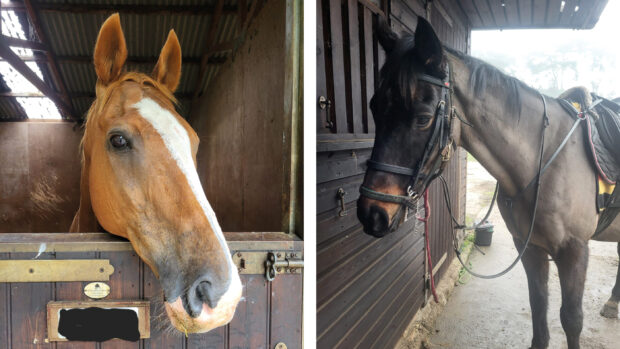Owners are calling for more research into the condition equine atypical myopathy after as many as 20 horses have died in Cornwall in just a few weeks.
Sam Grange, who lives near St Austell, lost her 14-year-old ex-racehorse Haughty Lady to the disease on 27 October.
Alistair Todd from Churchend vets treated the mare and it was the first time he had seen the condition.
Atypical myopathy weakens the muscles and can present like colic. Horses may be shivering, sweating or collapse. They have a high heart-rate, look weak and have dark red-brown urine.
The mortality rate is around 70%. Horses diagnosed early can be treated with intravenous fluids, but it has a rapid onset. It is not contagious and can affect horses of all ages.
Mrs Grange has donated tissue from Lady to Dr Richard Piercy, head of comparative neuromuscular disease at the Royal Veterinary College, who has been researching atypical myopathy for three years.
“She was a fit, healthy mare,” said Mrs Grange. “We hope her death can save others with research.”
Dr Piercy told H&H: “Cases are not area specific and it often occurs at this time of year in horses that are outside. We have confirmed it is due to an ingested toxin — possibly from a fungus or bacteria.
“We seem to be seeing more cases now, but I don’t think that’s just because we’re recognising it more.”
The owner of a yard near Penzance, who did not wish to be named, has had two horses die over the past month.
The first, three weeks ago, was a four-year-old coloured pony. The second, on 26 October, was a three-year-old thoroughbred.
She said the pony had been “peeing Guinness”, adding: “He just collapsed in his field and was very unresponsive.”
Graham Sherwin from Rosevean vets in Penzance hadn’t seen the condition before. He advises owners to avoid low-lying paddocks surrounded by trees, or those with streams through them, and to stable horses overnight.
“Stay vigilant and if you see changes contact your vet. Horses can go downhill fast,” he warned.
Watch out for a vet feature on atypical myopathy coming soon in H&H.
This article was first published in Horse & Hound (4 November, ’10)




